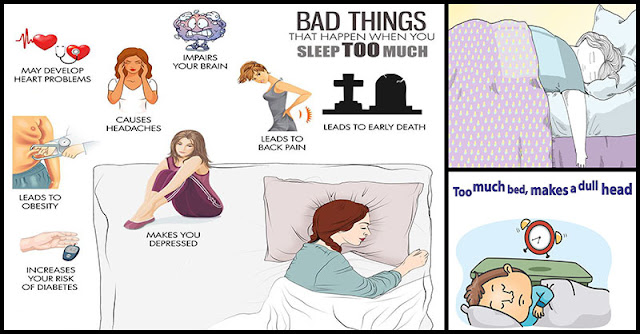Various studies have confirmed the harmful effects of sleep deprivation on our health, but is there data on the effect of sleeping too much?
According to a study which covered a meta-analysis that involved three million individuals, people who slept nine hours or more a day died earlier than those who slept eight hours. Furthermore, sleeping 11 hours has been found to had an increases odds ration risk of about 50%. This study was published in the Journal of the American Heart Association.
Can You Have Too Much Sleep?
How many hours do you need to sleep every night? Seven to eight hours? Or, is sleeping for too long a marker for a certain condition?
You will need more sleep the next day if you stay up late. If you are not feeling well, you will also need more sleep. This only means that a good sleep is needed for you to recover your strength, especially if you have illnesses which often provokes more sleep.
If you suffer from the conditions listed below then, you often need more sleep than those who are otherwise healthy:
- Chronic pain, lupus, or rheumatoid arthritis
- Congestive heart failure
- Attention deficit disorder (ADD)
- Bipolar disorder (People rapidly shifting through moods can also sleep too little or too much.)
- Congestive heart failure
- Depression (This can make you sleep too little, too much, or both)
- Those taking sedating medications (e.g., anti-hypertensive drugs)
Oversleeping
Sleep apnea and narcolepsy are sleep disorders that often make people oversleep.
In sleep apnea, airflow is diminished and synchronization between the lungs and heart are disrupted. Meanwhile, narcolepsy is linked to symptoms like hallucinations, sleep paralysis, and excessive sleepiness. In addition to these, people with insomnia may suffer from sleeping too long, or hypersomnia.
People spend more time snoozing when they are unable to sleep efficiently. This means that, if a person sleeping for only four hours wants to sleep for eight hours, then he may be spending more time in bed as he tries to catch up on his sleep. But usually, this strategy is counterproductive.
Insomnia is commonly treated through sleep restriction, which posits that “time asleep equals time in bed.” You can increase your capacity of “relearning “how to sleep once you get shorter but more solid sleep. Also, sleep restriction will help reset an insomniac’s biological clock, most especially if the techniques they use to get more rest are disrupted.
Obese people also tend to sleep long. Most kinds of inflammation make people sleep longer, and obese individuals often experience an increase in inflammatory markers in the body.
Oversleeping has been found to be associated with acute and chronic illnesses, along with stress caused by school, work, and family.
Why Do You Need To Sleep?
When you’re sick or stressed, your body needs to sleep. Sleep makes your body stronger, particularly when you are not feeling well.
The renewal linked to sleep is informational, and it involves protein, DNA, and cellular memory. This renewal also engages the rebuilding of tissues, like your skin or the connective tissue in your muscles.
For most people, body rebuilding-sleep is optimal for seven hours or so, with the consideration of their current work-life conditions.
Yet, some people sleep less because it’s in their genes. They are called “functional hypomanics,” wherein they can survive on only three or four hours of sleep.
A present clinical guideline recommends that an average adult needs about seven to eight hours of sleep for them perform better and look healthier. On the other hand, a couple hours more are needed by adolescents so that they can learn efficiently and function well.
Sleeping long is a symptom. It won’t kill you outright if you sleep more than eight hours. Yet you must keep in mind that the right amount of sleep is needed to maintain your mental and physical health.









